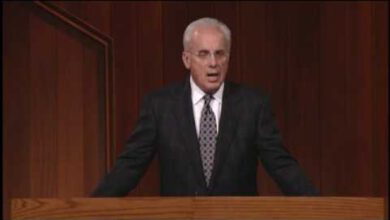Bible Questions and Answers, Part 65
Thank you for joining us tonight. I know this is a busy season, and that’s why we decided to keep things a bit more informal. Think of it as a family gathering, as if we were all gathered in a large living room, spending time together. For many years, I’ve been hosting these Q&A sessions, going all the way back to the early days of our church. In the beginning, I was worried I might be answering questions no one was asking, so I decided to listen more. I took my inspiration from the Apostle Paul, who, when meeting with people, “reasoned with them out of the scriptures” (Acts 17:2). The word “reason” here is from the Greek word “dialogo,” from which we get “dialogue.” Paul didn’t just preach; he would go from house to house, ministering to people where they needed it most and addressing their questions.
Tonight gives me a wonderful opportunity to hear what’s on your hearts and, hopefully, provide some answers to your questions that might not otherwise be addressed. We have three microphones set up, with guys stationed by them: Austin on the left, Chris in the middle, and Tom on the right. If you have a question, please go to one of those microphones. We don’t want to keep anyone waiting too long, so try to keep the lines short. If you don’t have a question, we can sing another hymn and take another offering. I’m sure, though, that many of you have questions, so feel free to line up.
Let’s start with this lady over here with Tom. What’s your name?
Lori Price – Hi, Lori, how are you? I’ve asked you this before when your husband was very ill, but people in our dementia ministry have asked the same question. It would be helpful if you could answer it again. In 2 Corinthians 4, it says, “Therefore we do not lose heart, but though our outer man is decaying, yet our inner man is being renewed day by day.” We are taught to use the Word of God to renew our minds, which the Holy Spirit uses to help us grow and sanctify us. But when someone has dementia, like Gary, who couldn’t communicate or reason for many years, or when someone suffers from mental illness or has a limited capacity to understand God’s Word, how is that verse fulfilled for them, especially when they can’t apply the Word to their hearts anymore?
Thank you, Lori. Lori and Gary were incredible members of Grace Church, and Gary was unfortunately stricken with Alzheimer’s for many years. Patricia and I were blessed to spend time with them during such a difficult season, and it was evident that their family, especially Lori, was filled with joy despite the trials they were facing.
To answer your question, it’s important to understand that the process of sanctification is related to one’s mental and spiritual capacity. We wouldn’t expect a young child to fully grasp the Word of God or apply it in a significant way, nor would we expect someone with a mental disability to do so. Spiritual growth is not limited to just those with high intellect, but it does assume the presence of a functioning mind. The Apostle Paul encourages us to think on things that are virtuous and praiseworthy (Philippians 4:8), and the Bible teaches that we are renewed by the transforming of our minds (Romans 12:2).
When someone experiences a mental incapacity, such as dementia, their ability to fully engage with Scripture may be hindered, and the process of sanctification can be affected. In these cases, the process might seem to be put on hold, but this does not mean spiritual growth ceases entirely. God’s work in the heart can still continue, even if the mind is no longer fully able to comprehend or apply the Word as it once did.
